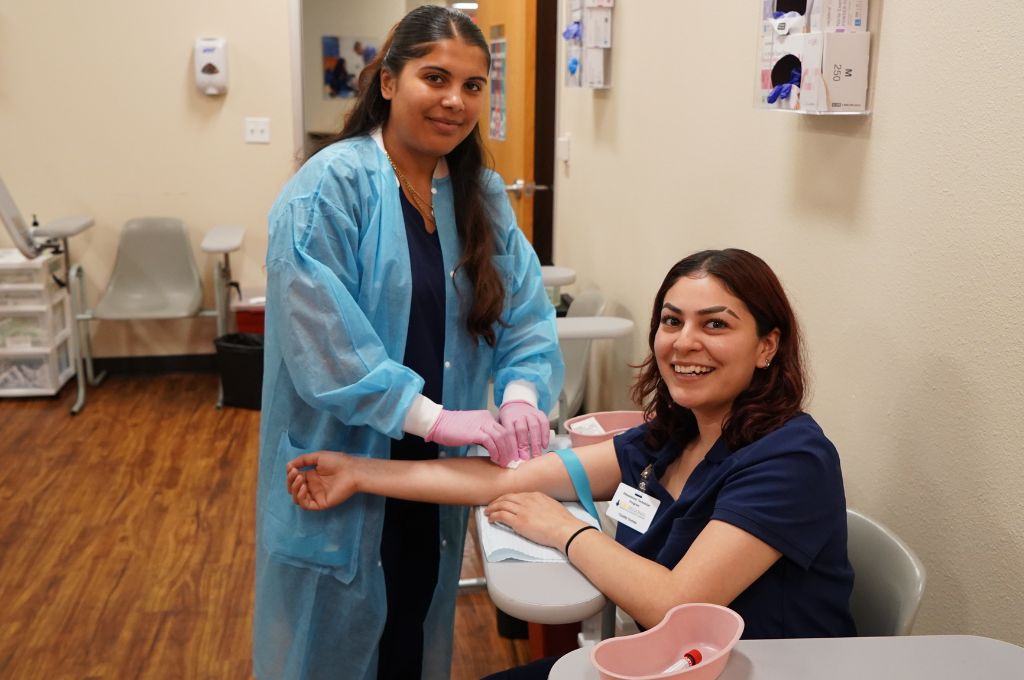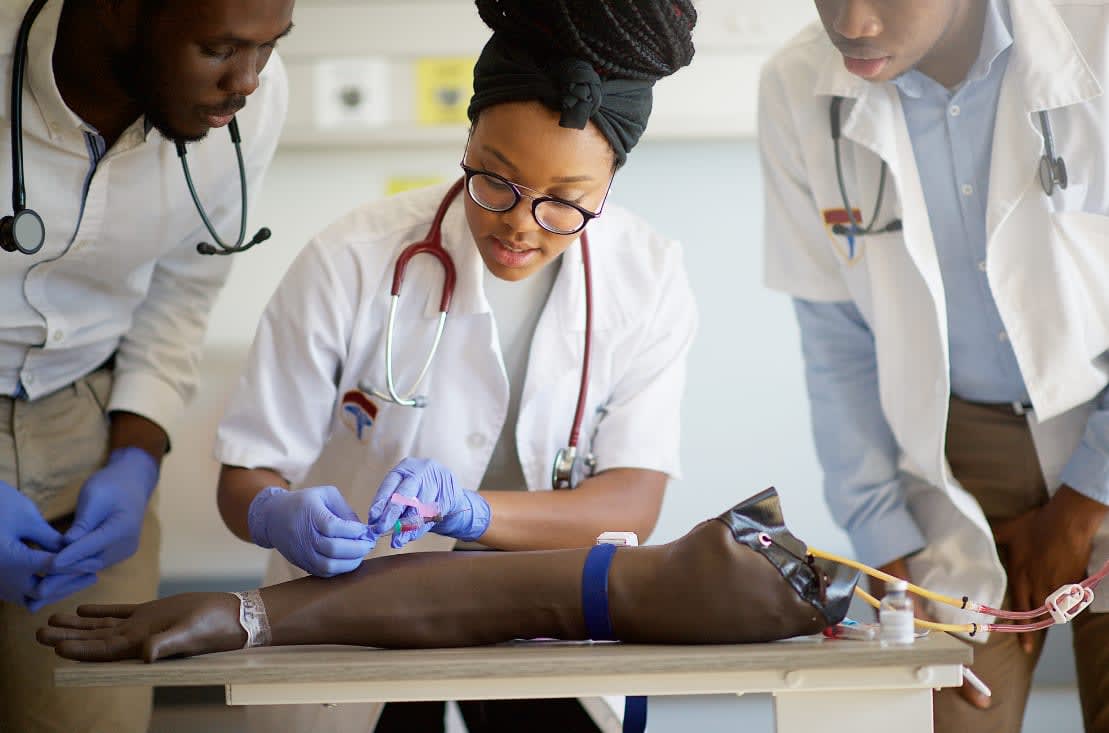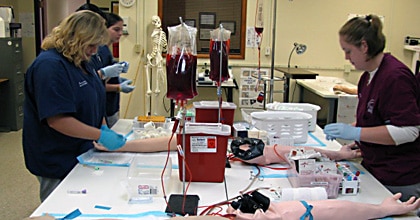Comparing Phlebotomy Courses Near Me That Match Your Budget
Wiki Article
The Course to Qualification: Recognizing the Phlebotomy Training Course Journey and Its Relevance
As you think about the course to accreditation in phlebotomy, it's vital to recognize the duty you'll play in healthcare. Your training will certainly cover important skills, from blood collection methods to patient interaction. Each element of the program prepares you for the difficulties ahead. What precisely does the journey entail, and why is certification so important for your future profession? Let's explore these questions better.
The Function of Phlebotomists in Health Care
Phlebotomists play an important role in the medical care system, serving as the important web link between patients and crucial diagnostic testing. You'll do blood draws, making certain samples are accumulated precisely and securely. Your know-how assists in diagnosing medical problems, keeping an eye on health and wellness, and directing therapy choices.In your everyday interactions, you'll need to develop depend on with individuals, making them feel comfy during what may be a stressful experience. You are in charge of classifying and managing samples meticulously to avoid contamination or errors, which could influence test outcomes.
Yet, you'll typically work together with medical professionals and registered nurses, interacting critical info regarding people' problems. Your function is essential in keeping the operations in medical care settings, guaranteeing prompt and accurate outcomes. By mastering your abilities, you contribute meaningfully to individual treatment, making you an important part of the clinical group. Embracing this responsibility is essential to your success as a phlebotomist.
Overview of Phlebotomy Training Programs
When checking out phlebotomy training programs, you'll locate various types created to fit different routines and discovering designs. Each program helps you develop vital abilities like blood collection and individual interaction. Comprehending these choices is essential to selecting the best course for your job.Kinds Of Training Programs
Several sorts of training programs are readily available for those looking to come to be proficient in phlebotomy. You can choose from certification programs, which commonly last a couple of months and concentrate on vital skills. There are also diploma programs that provide an even more complete education and learning, typically lasting up to a year. If you're searching for a deeper understanding, an associate level in a relevant area may be the best fit. Online courses offer flexibility for those stabilizing job or family dedications, permitting you to study at your own rate. In addition, some hospitals and facilities provide on-the-job training programs, providing sensible experience while you find out. Whatever path you pick, each program aims to equip you with the essential skills for a successful phlebotomy career.
Secret Abilities Developed
Mastering phlebotomy calls for a set of vital abilities that are developed via complete training programs. Furthermore, communication abilities are fundamental; you'll require to communicate with patients, clarify procedures, and placed them at simplicity. Each of these abilities is necessary for your success as a qualified phlebotomist, making you a useful asset in any type of healthcare setup.Key Elements of a Phlebotomy Course
In a phlebotomy program, you'll concentrate on vital subjects that prepared for your future career. You'll participate in hands-on training that permits you to apply what you have actually learned in real-world settings. Both the curriculum and useful experience are essential for your success as a phlebotomist.Curriculum Overview
While going after a phlebotomy training program, you'll experience a curriculum designed to furnish you with basic skills and expertise. Phlebotomy Training Course. This educational program generally consists of anatomy and physiology, concentrating on the circulatory system and recognizing blood components. You'll also learn more about various sorts of blood collection methods, including venipuncture and capillary leak techniquesIn addition, infection control and safety and security procedures are necessary elements, guaranteeing you know how to preserve a sterilized setting. You'll study patient communication, stressing communication and compassion, which are critical for relieving individual anxiousness. Honest and lawful factors to consider will certainly be resolved, preparing you for real-world obligations. This foundational understanding will certainly allow you to stand out as a phlebotomist and give top quality treatment in professional setups.
Hands-On Training Experience
Getting hands-on experience is an indispensable component of your phlebotomy training course. This sensible training allows you to use what you've learned in a real-world setting, boosting your skills and self-confidence. Phlebotomy Classes Near Me.In addition, you'll get the opportunity to connect with clients, which is essential for establishing your interaction skills. This mix of technological efficiency and social abilities is vital for your success as a qualified phlebotomist. Ultimately, hands-on training is where concept fulfills practice, solidifying your expertise and readiness for accreditation.
Qualification and Licensing Requirements
Before you Source can start your job in phlebotomy, it is vital to comprehend the accreditation and licensing needs that vary by state. Many states need phlebotomists to hold a qualification from a recognized organization, such as the National Phlebotomy Association or the American Society for Scientific Pathology. These qualifications generally include passing an examination that examines your knowledge and skills in the field.Along with accreditation, some states have certain licensing needs. You might require to finish a particular variety of hours in clinical practice, submit proof of training, or undergo a background check. It is very important to investigate your state's regulations to make certain you satisfy all required requirements.
Remaining notified concerning these needs not just assists you protect a setting but also enhances your reliability as a professional. By fulfilling these requirements, you'll be well on your way to an effective job in phlebotomy.
Hands-On Training and Practical Experience
Hands-on training and sensible experience are crucial parts of your phlebotomy education and learning, as they enable you to apply theoretical knowledge in real-world situations. Throughout your training, you'll participate in supervised venipuncture, learn correct methods, and end up being knowledgeable about numerous blood collection tools. This straight involvement is crucial for building your confidence and sharpening your abilities.You'll work very closely with knowledgeable experts that can lead you with the nuances of person interaction and sample handling. Each technique session not only reinforces your understanding however also prepares you for the busy atmosphere of healthcare setups.
Furthermore, many programs integrate clinical turnings, enabling you to view experience diverse setups, from healthcare facilities to outpatient clinics. This direct exposure helps you adjust to different challenges and individual needs, ensuring you're well-prepared for your future duty. Embrace these possibilities, as they're necessary to becoming a competent and thoughtful phlebotomist.
Difficulties Encountered During Training
While gaining hands-on experience is necessary, it's important to recognize the challenges that can develop throughout your phlebotomy training. In addition, mastering the skills required for blood draws takes method; you may struggle with strategy originally.Time monitoring can also be a difficulty, as harmonizing concept, sensible sessions, and individual dedications can really feel daunting. You might encounter differing discovering speeds amongst your peers, causing sensations of self-doubt if you believe you're falling back. Lastly, adapting to the different personalities of instructors can be challenging, as each might have an one-of-a-kind training design.
Identifying these challenges early can prepare you for success and assist you establish durability throughout your training journey.
Profession Opportunities After Certification

As you get experience, you may also think about concentrating on areas like pediatric or senior citizen phlebotomy, accommodating details individual demands. Some phlebotomists select to progress their occupations by ending up being research laboratory specialists or seeking additional education and learning in healthcare areas.
In addition, your accreditation can lead to duties in training or overseeing new phlebotomists, enabling you to share your knowledge. With the medical care industry continuously expanding, your skills will always be in demand, leading the method for a stable and fulfilling occupation. Embrace the opportunities waiting on you!
Regularly Asked Questions
What Is the Regular Duration of a Phlebotomy Educating Course?
Phlebotomy training programs typically last around four to 8 weeks. You'll take part in hands-on technique, classroom instruction, and on the internet understanding. Completing this training prepares you for accreditation and a redirected here fulfilling profession in medical care.Are Online Phlebotomy Courses Available?
Yes, on-line phlebotomy courses are offered. They use flexibility and benefit, permitting you to research at your very own rate. Just verify the program is recognized to fulfill qualification demands and get beneficial abilities for your job.How Much Does Phlebotomy Training Usually Expense?
Phlebotomy training commonly sets you back between $700 and $2,500, depending upon the program and location. You ought to think about variables like training course length, included materials, and hands-on experience when picking the right training for you.What Prevail Requirements for Phlebotomy Training?
Usual prerequisites for phlebotomy training commonly include a high institution diploma or GED, immunizations, and a history check. Some programs may also require standard healthcare expertise or certifications, guaranteeing you're prepared for hands-on training.Can I Function While Completing My Phlebotomy Training?
Yes, you can work while finishing your phlebotomy training. Lots of trainees equilibrium tasks with their researches, however ensure to manage your time properly to ensure you fulfill both work and training commitments efficiently.Report this wiki page